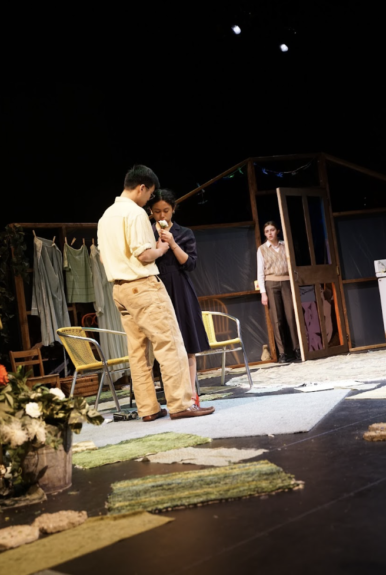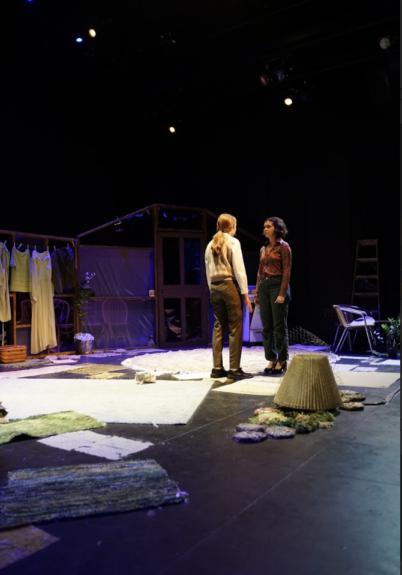On Thursday, March 30, Deputy Editor Sophie Conrad and Social Media Editor Talia Bloom attended Humble Boy in the Glicker-Milstein Theater, produced by the Columbia University Players.
Humble Boy, written by Charlotte Jones, is a story of loss, insanity, and redemption. Directed by Maya Shore (BC ‘25) and produced by Luisa Nahr (BC ‘25), this play is a modern rendition of Shakepeare’s Hamlet, presenting Felix as a struggling genius trying to make sense of changing family dynamics and philosophical questions.
We are introduced to the main character, Felix Humble, portrayed by Reese Alexander (BC ‘25). He has returned to his countryside home after the death of his father, James Humble, beloved etymologist and horticulturist. Felix not only mourns his father, but his father’s bees, which have been removed by his mother, Flora (portrayed by Mimi Wu, CC ‘26). Mercy (Lucia Towne, BC ‘26), Felix’s kindly neighbor, pleads with Felix in the opening scenes to return inside for the funeral reception. As Felix rambles about bees and theoretical physics, Flora comes out to the greenhouse to berate her son for not speaking at the funeral, and frequently interrupts the conversation with concerns about her new nose job.
As Felix stays at home for the summer, he grows more and more disgusted with his mother’s attempts to criticize him, and instead turns to the gardener, Jim, portrayed by João Santos (CC ’24). Jim is everyone’s comfort character: a breath of fresh air to the otherwise strangled household dynamics, and the only thing Felix finds solace in, aside from the drugs he frequently takes to calm his nerves. Meanwhile, Flora further explores her relationship with George Pye (Aidan Ong, CC ‘26). George is lighthearted and hopelessly in love with Flora, until their relationship is strained by Felix’s presence at home. It is later revealed that they were having an affair during Flora and James’ marriage, a fact that everyone seems to know but Felix.

Felix is visited by his former girlfriend, Rosie Pye (Shea Rodriguez, CC ‘26). She reveals that she and Felix have a daughter together, before hurrying off to get her daughter from the babysitter. In disbelief, Felix continues to spiral in impressive monologues backed by dramatic lighting and droning of the bees.
The second act largely revolves around a dinner party that Flora is throwing in the greenhouse. Flora finally reveals to Felix that his father didn’t die of a heart attack, but was instead stung by a bee and went into anaphylactic shock. Finally, the show concludes with a touching reveal: Jim, the gardener, is actually the spirit of James Humble. As Flora can suddenly see this presence, Flora is faced with a change of heart, realizing how awful she was to her husband, breaking up with George, and inviting Felix to stay the night instead of rushing off to university.
Humble Boy’s set, costumes, and sound were truly stunning. From the moment we entered the theater, we were immersed in Felix’s world, from the humming of bumblebees to the beautiful set. Even before we entered, we walked through small sets, which transported us even more! The set featured rustic aspects in a creative setup: an apple tree being created by a ladder and stacked chairs delicately balanced with apples. Dragonfly string lights, a hose, flowers, and a bed adorned a main set framing every scene. The costumes were beautiful and aesthetically consistent with the play’s themes; Felix dressed as a dark academic, while Flora donned the clothing of the city woman she was. Mercy perfectly portrayed your typical, sweet, country neighbor, with good intentions all around and a backbone to stand up to Flora at the end of the performance.
Felix and Rosie’s chemistry was off the charts amazing. Felix establishes himself very early on as a frenzied, anxious academic, full of theories about physics and black holes. He’s out of his depth in the countryside, to which Alexander brings a haunting fury to the role. He clearly cares about his work, about his father, and about the bees, but we don’t get to see him interact with someone he truly cares about until Rosie (Rodriguez) comes to the greenhouse. Their dialogue is quick, snappy, and slightly strained, yet real.

The acting in Humble Boy was good. Too good, perhaps. The tension and complex relationships between characters was clear, and each character shined in their roles. There was a lack of cohesion and chemistry between some characters that was furthered by the slow moving plot. However, this could certainly have been an accurate portrayal of the difficulties Felix and Flora have, or the complete opposite nature of Flora and George. Mercy’s awkwardness and naivety highlights the power that Flora holds over her and the community at large. Rosie’s powerful, independent nature completely contrasted her father’s bluster. Jim, aka the spirit of James Humble, gave the audience a kindness that the show was lacking throughout much of the performance, and truly shined as an individual.
Throughout the entire performance, the theme of grief was well-portrayed in the many forms it takes on. Felix and his mother are deep in the throes of mourning, but we see Rosie also mourning her mother seven years later. Grief is described as something ongoing—“time doesn’t heal, but it accommodates”—yet characters like Felix dispute this very statement, claiming that the sentiment is cliché. Felix’s monologues describing his complete loss and confusion were made genuine with dramatic lighting and growing humming sounds, as if the bees were haunting him as well as displaying his heightened and uncontrollable grief and anxiety. Sillier comments like “I think you’re psychotic. You just handed me my father in a honeypot” help break up tense, serious moments of emotion, showing how grief is all-encompassing and heavily varies. While the play presented mental health honestly and vulnerably, the script’s lightness with which suicide was approached felt jarring and difficult at times. At other times, such as the dinner party, the topic of suicide and one’s “preferred method” of suicide being the “housewife’s choice” was shocking and lacked adequate reflection or transitions.
By no means is Humble Boy a lighthearted play, but the more serious moments that show how Felix’s struggle with depression are counteracted by quick quips and beautiful moments from the other characters. George, despite his alcoholic tendencies, jaunts, sings, and dances around the greenhouse with his Walkman, bringing a youthful energy to his strained relationship with Flora. Another touching moment was when the spirit of James Humble brings life back into Flora’s life by collecting the flowers in the greenhouse, flowers that had been on set throughout the show.
Humble Boy gives insight into the intricate relationships of a family in mourning. In no way is it meant to be a comfortable show, and instead, it challenges the viewer and how one perceives normalcy. At first glance, it is an exploration of a mother and son’s relationship, but later establishes the perpetual nature of a small community, and communal approaches to family, connection, and grief. Humble Boy questions humility, the perception of urban superiority, and dysfunctional family dynamics in a witty and beautiful two hour play.
All images of Humble Boy via Olivia Kuan-Romano, BC ’26


 1 Comments
1 Comments
1 Comment
@anonymous I’m confused. Was Felix’s dad a scholar of word origins (etymologist) who just happened to keep bees as a hobby?